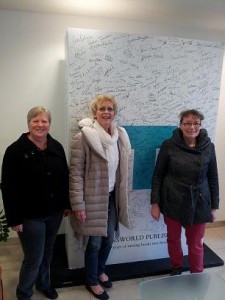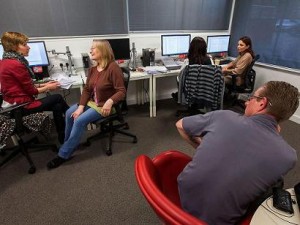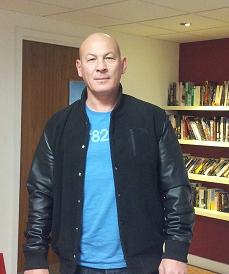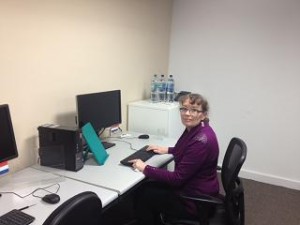“To Hell And Back”: Translating Dan Brown’s “Inferno” by Dutch Translator, Marion Drolsbach
 Introduction:
Introduction:
On Monday I promised you something extra special—the inside story on translating Dan Brown’s Inferno, from Dutch translator Marion Drolsbach, (who was also the translator for The Heir of Night—Kind van de Nacht). As I said then, I felt this was quite a story and offers an insight into the world of mega bestselling titles, so I’m delighted Marion is willing to retell it for you here. The account carries on into the launch of the book in The Netherlands, which is why the story will be posted in two sections—the first one, the translation, today and the second, The Netherlands launch, tomorrow. Enjoy!
—
To Hell And Back: Translating Dan Brown’s Inferno
by Marion Drolsbach (one of the three Dutch translators working on the project.)
Not many people can fail to have noticed that Dan Brown has recently published a new thriller. Uniquely, his book came out both in English and a number of other languages simultaneously. I am one of three translators who were chosen to translate Inferno into Dutch. The job proved to be a roller-coaster ride full of twists and turns, just as adventurous as the plot of a Dan Brown thriller. When I mentioned this to Helen in an email, she invited me to write about ‘the grand theatre of [my] life as a translator’ on her blog.
Code Word
So, what was it like to take part in such a high-profile project? For my two colleagues, Erica Feberwee and Yolande Ligterink, and me it all started back in December 2012 with a cryptic phone call from our editor at Luitingh-Sijthoff. She spoke to each of us in turn for well over ten minutes without naming either the author or the title of the book. Yet somehow she still managed to convey that she wanted us to translate the unnamed famous author’s latest thriller, probably sometime in February 2013, but definitely in London. In London??? Having arranged a code word to be used in all future communications regarding this mysterious project, she hung up, leaving us wondering about the practicalities of working far from home.
Perhaps I should explain that translators, like writers, tend to be solitary creatures who prefer to toil away alone, generally in the comfort of their own home. Some are used to typing along to the sound of opera, while others need silence to summon up concentration. How was this going to work out if we had to translate together in the same room, in a city many miles from our familiar surroundings?
By the time February came round, our publisher had organised tickets and a place for us to stay. We arrived in London on a chilly Sunday afternoon, raring to start on our secret mission bright and early the following Monday morning.
Brown Central
A fifteen minute walk from our flat took us to the office block where we would be spending many hours a day for the next four weeks, cooped up in the basement with our fellow conspirators – a group of translators from other European countries – under the watchful eyes of a couple of burly security guards. This was Brown Central, where nothing was left to chance. Before we were allowed inside, we had to show our passports and sign for an entry swipe card. The friendly official at the front desk had strict instructions to let nobody go in without a thorough check. Eventually we were cleared for entry through a hidden side entrance to a corridor leading to the room which contained our work stations. Each monitor had been thoughtfully adorned with a cute little paper country flag – a nice touch. We were efficiently allocated computers with a Swedish flag on the monitor, but that mistake was soon remedied.
In due course our Swedish colleagues arrived, along with translators from Denmark, Finland, Norway and Turkey, the latter contingent comprising two Turkish sisters of whom one had even postponed her wedding for the privilege of translating Dan Brown.
Rules
During a brief introduction we were told what to expect. We’d be working with one security guard in the room, while another one kept a close watch on proceedings from the meeting room outside. Our manuscripts were numbered print-outs, which were locked away with a guard outside the door whenever we weren’t translating from them. All mobiles, handbags and coats had to be locked away as well. We had to use unfamiliar but brand-new computers equipped with all the necessary software for our various languages, including spell checkers and dictionaries, but which had no USB ports or internet connection. Of course, translating Dan Brown without the means to look things up would have been impossible, but fortunately they had provided us with two internet computers. Sometimes you had to wait for a colleague to finish searching before you could have a go on Google yourself.
Gaga
Imagine how hard it is to work in a room with other people and a security guard sat nearby, who was understandably bored out of his mind at having to watch a motley group of translators typing away rather than guarding the glamorous likes of Lady Gaga or Madonna. At first the guards were curious and asked us how many words we’d done each day and who had been the fastest. But after a few days they got tired of that and kept themselves sane by listening to their iPods (audibly…) or watching films on their iPads (audibly…).
As for collaborating on the same text, my two colleagues and I knew we could rely on each other, having been part of the four-strong translation team for Dan Brown’s previous thriller The Lost Symbol in 2009. That had also been a tall order, as we had to complete our translation in just two weeks! For a manuscript that size we would normally get three to four months…
Although on the one hand translating under such strange conditions was hard, it was also surprisingly easy on the other. In the ‘translation bunker’ there were no distractions, we had no domestic duties or commitments and none of the hassles we normally deal with when working at home. Crucially, there was no opportunity for what in certain Dutch translation circles is known as ‘woggen’, a made-up verb based on the abbreviation w.o.g. for werkontwijkend gedrag, or work-avoiding behaviour, the art of procrastination. There was little else to do but work, and so we translated diligently from nine in the morning till at least seven in the evening, with less than an hour’s lunch.
Exhausting
No wonder we were exhausted each night when we arrived at the apartment our publisher had rented for us. It was great to have a place to relax, as it wasn’t easy being away for a month. Some of our colleagues had been put up in a hotel or a shabby B&B, but at least we had a comfortable flat.
Once our Dutch translation was finished and ready to be handed over to our editor – his part of the job had to be done in London as well – we said goodbye to the others who were staying on, including the security guards and some of the office regulars. Inevitably, we had all become friends, swapping business cards and Facebook addresses. We promised to meet up again for an Inferno reunion, and the Turkish bride-to-be even invited us all to her wedding in Istanbul, which had been rescheduled for three days after D-Day, the all-important day of the world-wide book launch.
—
To be continued tomorrow, commencing with D: Day, 14 May 2013, when Inferno would be published in English along with twelve other languages.












This is truly fascinating! Thanks for sharing!
It is, isn’t it—and well worth the sharing 🙂
Glad you enjoyed reading it, Beth.
So nice to get an insight. Such stealth….amazing.Thanks Helen and Marion…..on to part two!
🙂 Ever the enthusiast, Yoka. 🙂